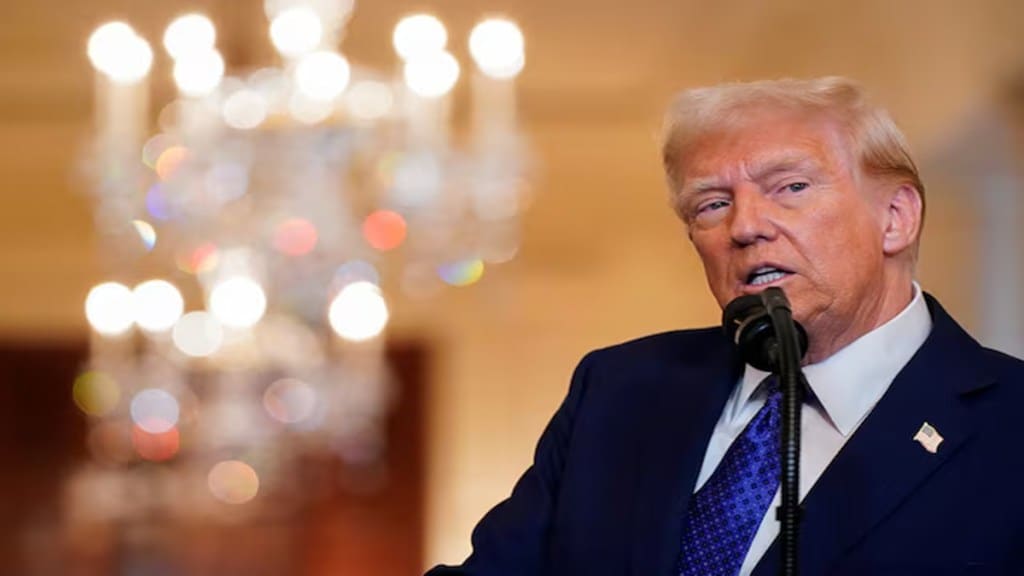By Jamal Mecklai
It pains me to admit it but Donald Trump is certainly the most consequential president the US has ever had. Of course, the consequences range from utterly appalling for children in Africa who have suffered (and died) as a result of the closure of USAID and, of course, people in Gaza who continue to be pounded by the Israeli army under (effectively) licence from Trump to, on the other hand, absolutely wonderful for Trump’s family that has been collecting, for want of a better word, hafta (protection money) from a wide array of companies and institutions in the US, and even countries from all over the world. Where the American people land within this spectrum is yet to unfold.
Shockingly, equity markets, which many (myself included) had felt would tumble to put a brake on Trump’s most egregious overreaches, actually appear to be doing extremely well, thank you. This could only mean that the big dump is yet to come, and/or the markets which themselves thrive on the corruption of capitalism are simply enjoying this as business (largely) as usual. Which again suggests an even huger dump is on the cards. It is well known that markets sometimes take a very long time to react to circumstances, but when they do they move with lightning speed.
Tariffs, markets and rising risks
While there could be occasional short-term upward bursts, particularly as the hafta king celebrates some of his “victories”, staying long US global equities is dangerous. (I note that Warren Buffett continues to hold a huge percentage of his portfolio in cash.)
Interestingly, the bond markets, which everyone expected to be the first to scream bloody murder, are also relatively calm, particularly given the circumstances of Trump abusing the Fed governor and moving alternatives in place. To be sure, the push-me-pull-you tariffs have already added (I think) over $500 billion to the treasury and Trump’s advisers that understand only linear extrapolation are assuming much more to come—$3 trillion is the number being kicked about—particularly with steeper tariffs about to kick in. While this could certainly result in a huge reduction in fiscal deficit—one of the number of economic problems facing the US—the concern is that the tariffs will be paid by American companies that are importing, which will, over time, be passed on to American consumers. Thus, this potentially huge flow of funds to the government coffers will act like a very regressive tax since it would affect the normal American consumer much more, relatively speaking, than the well-heeled ones, reflecting, once again, Trump’s instinctive approach to protect the rich at the expense of others.
US producer prices have already started screeching higher, and, as the fundamental rules of economics will always apply, are likely to continue to rise. It is possible that the heavily-pressured Fed may cut rates by a nervous 25 basis points (bps) in September—Trump and treasury secretary Steve Bessent are demanding 150 bps over the next year—and this may unleash more threats and public posturing, which will certainly not speak to a benign long-term rate environment. Interest rate volatility is sure to rise and the continuing uncertainty will make defining borrowing requirements extremely tricky.
Implications for India
Trump’s transparent Ukraine gambit for the Nobel Peace Prize is another shocker. Of course, the Norwegians are not only sane but extremely rich, so simply buying them out will be a tall order. From India’s perspective, Trump making nice with Putin could—fingers crossed—result in the extra 25% tariff being eliminated, which would be great. On the other hand, and particularly if the gambit fails, it is possible that Trump in his search for validation may turn back to “peacemaking” between India and Pakistan—this would ensure high tariffs remain in place.
The good news, if it can be called that, is that Trump has compelled everybody to acknowledge that India needs to step out of its business-as-usual policymaking and take some serious steps to strengthening its economy. Cutting the goods and services tax is easy—the real trick will come in addressing agriculture (and labour, education, healthcare, and employment opportunities), particularly given the government’s single-minded focus on politics so far.
Indian agriculture, while it continues to show growth, is extremely inefficient with yields lower than most other major players. The longstanding problems are small farm holdings, limited irrigation, and technology adoption. The farm laws could have been the beginning of real change; a revamped push is needed, which will require the government to build meaningful bridges with the sector and the Opposition (which may be quite a trick), and to broaden the plans to include non-agricultural employment opportunities for small farmers.
And all this while dealing with the hafta king.
The writer is CEO, Mecklai Financial.
Disclaimer: Views expressed are personal and do not reflect the official position or policy of FinancialExpress.com. Reproducing this content without permission is prohibited.


